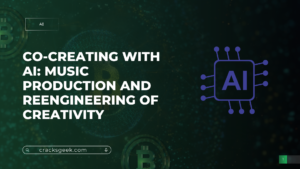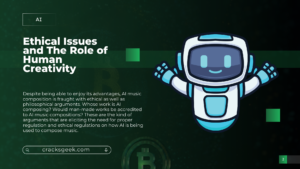
Artificial Intelligence (AI) is revolutionizing the music world, redesigning the process of creatives producing, making, and releasing music. In spite of fears that AI would supersede creative human work, the fact remains that AI is a productive collaborator that enables and develops artistic creativity. With AI applied to music production, artists are able to push creativity to new heights, optimize workflow, and unlock new sonic horizons. This article is on how AI is transforming creativity in music composition and how artists can collaborate with AI to create new creative avenues.
1. AI as a Creative Assistant
AI-powered programs become indispensable creative resources, creating ideas, composing melodies, and even entire songs. AI-based apps like AIVA and Amper Music are able to search through large collections of music in order to create compositions worthy of part of an artist’s repertoire. The software gives inspiration and shatters the inspiration obstacle, with automation playing the music.
The artists can experiment with new things they never thought they could do with the assistance of AI. AI can generate chord progressions, provide harmonic structures, or come up with new texture sounds that are not necessarily tied to traditional ways. AI is not designed to substitute human imagination but is more of an enabling collaborator, offering more musical possibilities to artists.
2. AI for Sound Design
AI is revolutionizing sound design by offering new ways to manipulate and create unique sounds. Tools like Google’s NSynth and OpenAI’s Jukebox use deep learning to generate entirely new sonic textures that go beyond traditional synthesis methods. AI can analyze and blend different sounds, creating hybrid instruments that would be difficult to design manually.
This technology allows producers to develop distinctive sounds that distinguish their music. AI plugins can propose parameters, build complex modulation patterns, and sound process in real time. This intelligent shaping and automation of sound facilitate artists to surpass sound design limitations, and the dawn of a new era in sonic discovery.
3. AI in Music Mixing and Mastering

Mix and master are two most essential phases of music production, ensuring an elegant end result. Plugins like LANDR, iZotope Ozone, and Sonible’s smart:comp provide machine learning–based computer solutions in the form of level matching, equalization, and compression. Software learns automatically from professional mixes and includes industry-grade tweaking to tracks using machine learning.
AI-based mixing and mastering hardware provides professional-quality production in the domain of independent artists who don’t have the services of professional engineers. AI can never replace creativity of experienced sound engineers but can be a wonderful assistant to accelerate and optimize less complicated mixes at lower costs. Democratization of professional-quality production hardware enables more artists to target professional-quality sound without requiring as much technical expertise.
4. AI-Based Lyrics and Songwriting Assistance
Writing lyrics can be one of the most challenging aspects of music production. AI-powered tools like OpenAI’s ChatGPT and Google’s Verse by Verse assist songwriters by generating lyrics, suggesting rhymes, and even mimicking specific writing styles. These tools help artists find new perspectives and overcome writer’s block.
Though AI-created lyrics may be lean in emotion, it is a platform that can be molded and designed by artists. Artists use AI as idea partner where artists would write together and produce new lines but maintain the artist voice. Human creativity with the aid of AI in this way brings more effective and economic songwriting.
5. Live Show and AI Incorporation
AI is also taking over the live shows with an improvement in the video and audio quality. AI algorithms can generate real-time imagery in sync with music to provide digital concerting experience in real time. AI instrumented instruments such as Yamaha’s AI-generated piano can harmonize with artists in real time and react accordingly.
Live artists can integrate AI to provide interactive performances where the AI system can be adaptive to fit impromptu improvisation or response. Integrating AI with live music creates new, new performances with new possibilities for a type of experience different from the current concert experience. Music performance and music listening will be augmented by the advancement of the technology in AI.
6. Ethical Issues and The Role of Human Creativity

Despite being able to enjoy its advantages, AI music composition is fraught with ethical as well as philosophical arguments. Whose work is AI composing? Would man-made works be accredited to AI music compositions? These are the kind of arguments that are eliciting the need for proper regulation and ethical regulations on how AI is being used to compose music.
Apart from this, AI can write great music but lacks emotional richness and human experience of artist performers performing pieces by themselves. Music is just one human means of expression of culture, emotion, and narrative—an experience even best AI can’t provide. The formula to successful sharing of space with AI is to strike a middle path between technological advancement and human artistic intention.
Conclusion: Embracing AI as an Artistic Colleague
AI is not taking over creativity, however, and rather is merely a means of expanding artistic capabilities. From aiding the composition and sound design efforts to taking over the mixing and mastering process, AI is revolutionizing the music creation process with excitement and innovativity. But music is emotional human stuff, and therefore AI must be considered an assistant and collaborator, and never a replacement.
With AI as a co-creator collaborator, the artist can explore new realms of art, automate tasks, and experiment with sound that was previously unimaginable. With the evolution of technology, music composition will be based on the fusion of human creativity and AI brilliance.





